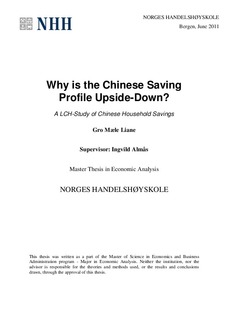| dc.description.abstract | This master thesis estimates the saving profiles of Chinese households in 1995 and 2002 and discusses possible explanations for the high and increasing saving rates among the young and old generation in China. The high saving rate among young and old households relative to mid-aged households has created a u-shaped saving profile. The Chinese saving pattern is quite different from the pattern observed in most OECD countries where savings tend to increase up to a mid-life age and then decrease. After controlling for employment, education and income, we find that the increase in savings has been especially large among young households. We suggest two potential reasons for the increase: precautionary savings and saving for housing purchases in the presence of credit constraints. First, the period from 1995 to 2002 was related to more income uncertainty and a larger private burden of health expenditures. Second, housing was privatized, which combined with a strong value appreciation on urban real estate, makes it necessary for young households to save more in order to enter the property market. We use the Life Cycle Hypothesis (LCH) to discuss the present features of the Chinese saving profiles. We show that a LCH-model with income uncertainty can explain high saving rates among young households in China. We also introduce a housing purchase to the LCH-model and show that in the presence of credit constraints this can also contribute to high saving rates among young households. | en |
